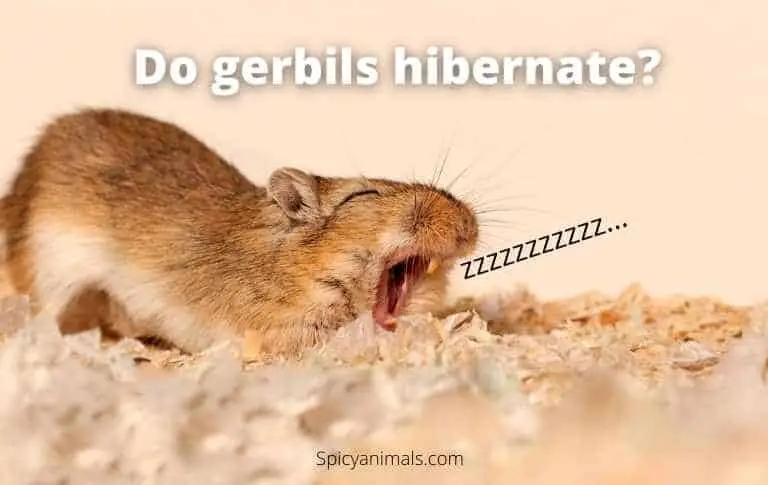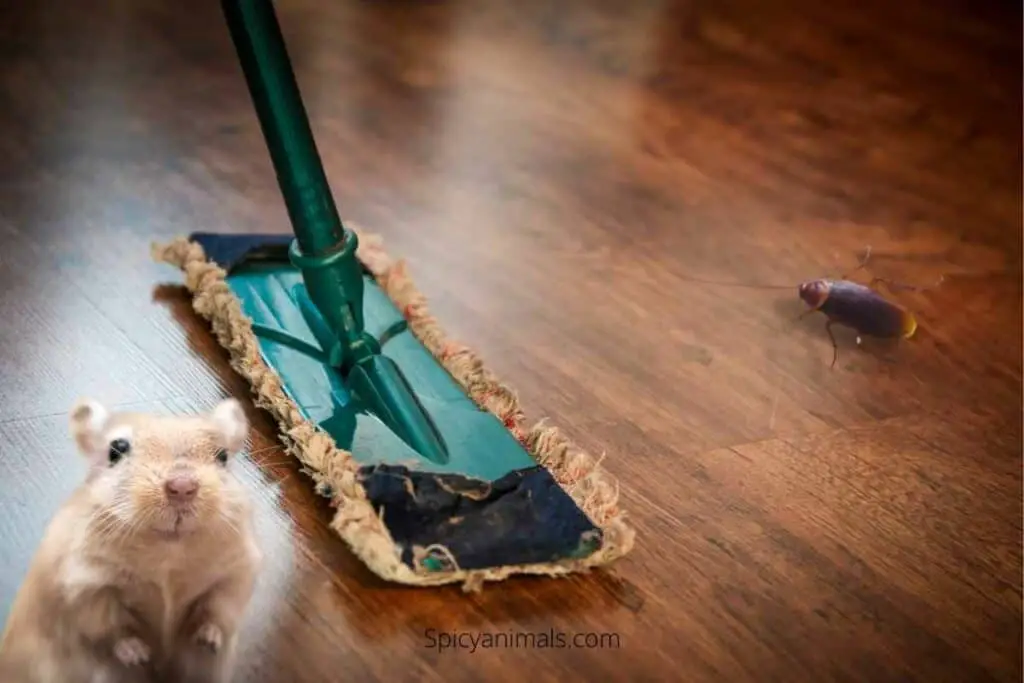Do gerbils hibernate? Many pet owners wonder about this aspect of gerbil behavior. Understanding their hibernation patterns can help ensure their well-being and proper care.
Gerbils generally do not hibernate, although they may enter a hibernation-like state in extremely cold conditions. To determine if a gerbil is in this state, check for warmth and listen for breathing before assuming it has passed away.
Table of Contents
What is Hibernation and its relation to Gerbils?
Hibernation is a specialized physiological process enabling certain animals to survive winter by entering a near-dormant state.
During this period, vital functions like heart rate, breathing rate, and body temperature significantly decrease, and the digestive system slows down or shuts down to conserve energy.
Triggered by the animal’s internal clock and environmental changes, hibernation allows them to withstand extreme conditions.
Gerbils do not typically hibernate, but they may become lethargic in excessively cold temperatures.
To keep gerbils warm and prevent them from entering a hibernation-like state, maintain an indoor temperature above 55 degrees Celsius and ensure their cage is away from windows or doors.
Gerbils’ metabolic rate decreases in cold weather, so conserving body heat and maintaining warm enough conditions are crucial to their health. Monitor your gerbils for signs of lethargy or unresponsiveness, and if needed, gently warm them to prevent hibernation.
Understanding the nuances of hibernation and its relevance to gerbils will help you provide optimal care and keep your gerbils warm during the winter months.

Is your Gerbil Hibernating or Dead?
Contrary to popular belief, gerbils do not hibernate during winter but remain active year-round. If your gerbil becomes lethargic or exhibits prolonged inactivity, it might be sick or, worse, dead.
To determine whether your gerbil is hibernating or dead, follow these steps:
- First, look for signs of life, such as breathing or a heartbeat.
- Next, check for injuries or illnesses that could cause shock and apparent hibernation. Gently touch or make a noise to rouse your gerbil. If it remains unresponsive, it is likely dead. When in doubt, consult a vet for assistance.
To keep your gerbils warm and prevent hibernation-like states, maintain warm indoor temperatures and ensure their cage is away from doors, windows, and cold drafts. Monitoring your gerbil’s health and environmental conditions is crucial for their well-being during the cold season.
How to Tell If a Gerbil is Hibernating or Lethargic
Various signs can help you determine if your gerbil is hibernating or lethargic. Observing your gerbil’s behavior is the easiest way to differentiate between the two.
A hibernating gerbil seems to be resting but will quickly wake up and react when disturbed, while a lethargic gerbil appears listless and unresponsive, even when handled.
Body temperature is another key indicator; hibernating gerbils typically have a slightly lower body temperature compared to active ones.
Other signs of lethargy include behavioral changes, refusal to eat, weight loss, open-mouth breathing, hypothermia, dehydration, and irregular heart rhythm.
To keep your gerbils warm and prevent hibernation-like states, maintain a comfortable temperature in their environment, and position their cage away from doors, windows, and drafts.
If you suspect your gerbil may be hibernating or lethargic, consult a vet for help. Ensuring their well-being during extended periods of cold weather is crucial for their overall health.
Does Winter change the behavior of a gerbil?
During winter, gerbils may become less active due to temperature drops and scarce food in their native habitats. These conditions can lead gerbils to huddle together in their burrows to conserve body heat and stay warm.
Furthermore, gerbils might hoard food during winter, as they instinctively anticipate decreased food availability and ration their intake accordingly [2]. In some instances, gerbils may enter a hibernation-like state, becoming lethargic or unresponsive.
It’s essential to monitor your gerbils for behavioral changes during the winter months, as they may need extra care to keep warm and prevent hibernation.
Tips for Keeping Gerbils Warm in Winter
To ensure your gerbils remain active and healthy during cold weather, follow these tips to keep them warm:
- Maintain a comfortable indoor temperature: Keep your gerbils’ living space above 65 degrees Fahrenheit (18 degrees Celsius) to prevent hibernation or lethargy. Make sure it’s warm enough to ensure your pet isn’t too cold.
- Choose a suitable cage location: Position your gerbil’s cage away from windows, doors, and drafts, which can let in cold air. This will help maintain a warm and stable environment, even if they don’t go into a hibernation-like state.
- Provide proper bedding: Offer gerbils a generous amount of bedding material for burrowing and keeping warm. Options include shredded paper, hay, or aspen shavings.
- Monitor your gerbil’s behavior: Watch for signs of lethargy or unresponsiveness, which could indicate that your gerbil is too cold. If you notice your gerbil becoming less active than usual, consult your vet for guidance on how to warm their body and restore their usual state.
- Keep gerbils indoors: During freezing weather, it’s vital to keep gerbils indoors to protect them from harsh temperatures that could trigger hibernation.
- Provide a well-stocked food supply: Ensure gerbils have sufficient food during winter months to accommodate their natural hoarding behavior and maintain their energy levels.
By understanding the effects of winter on gerbils and taking steps to keep them warm during cold weather, you can prevent hibernation-like states and ensure they stay healthy and active.
If your gerbil is unresponsive or appears sick, it’s always best to consult your vet for advice and guidance. Paying attention to heart rate, breathing, and energy levels can help you determine if your gerbil is experiencing lethargy or going into a hibernation-like state.
Should I Try To Prevent My Gerbil Hibernating?
Gerbils are not true hibernators; however, they may enter hibernation-like states when exposed to cold temperatures for extended periods.
It is crucial to take measures to keep your gerbils warm and prevent hibernation-like states, as these conditions can be detrimental to their health.
To ensure your gerbils’ comfort, maintain a consistent and warm indoor temperature, preventing them from going into hibernation. Position their cage in a cozy area, away from doors, windows, and drafts, to establish an optimal environment.
Monitor your gerbil’s behavior for signs of lethargy or unresponsiveness, and consult a vet if you notice any concerning changes, such as a lack of movement or a drop in energy levels.
In summary, it is vital to prevent your gerbils from entering hibernation-like states by controlling temperature and monitoring their well-being during colder weather.
Providing proper care throughout the entire winter is essential for your gerbil’s health and happiness. Be attentive to their heart rate, breathing, and overall condition, as it’s important to address any issues that could arise from extended periods of cold temperatures.
By doing so, you’ll ensure your gerbils live a healthy and content life.
What are the optimal temperatures for gerbils?
Gerbils are not true hibernators, but they can enter a hibernation-like state called torpor when exposed to cold temperatures for extended periods[7]. It is essential to maintain optimal temperatures to prevent your gerbils from going into this state, as it can be detrimental to their health.
Optimal temperatures for gerbils range between 65 and 75 degrees Fahrenheit[2]. A consistent and warm indoor temperature helps keep gerbils active and healthy, preventing hibernation-like states[1].
Place your gerbil’s cage in a warm area, away from doors, windows, and drafts, to establish a cozy environment[6]. Monitoring your gerbil’s behavior for signs of lethargy or unresponsiveness is crucial, as it could indicate they are too cold or sick.
If you notice your gerbil isn’t moving or has a decreased heart rate and breathing, consult a vet for guidance on how to warm their body and bring them back to their usual state[1].
In summary, gerbils do not truly hibernate, but they can enter hibernation-like states when the temperature is too cold[7]. By maintaining optimal temperatures and monitoring their well-being, you can ensure your gerbils remain healthy and active throughout the year.
Conclusion: Do gerbils hibernate?
In conclusion, gerbils do not typically hibernate, but they may enter a hibernation-like state when exposed to cold weather for extended periods.
To keep gerbils warm and prevent hibernation, it’s essential to maintain a comfortable indoor temperature and place their cage away from doors and windows, where drafts can occur.
Gerbils become lethargic when cold, and it is vital to monitor their behavior for signs of unresponsiveness or prolonged sleep. Consult a vet if you notice any concerning changes in your gerbil’s behavior or health.
Gerbils can’t survive without adequate warmth, so it’s crucial to provide enough warmth in their environment to keep them comfortable and healthy.
Keeping gerbils warm indoors and away from freezing temperatures will help prevent hibernation-like states and ensure they remain active throughout the year.
By being attentive to your gerbil’s needs and providing a suitable environment, you can keep your gerbils warm and happy during cold weather.



